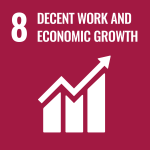Written by Bashiratu Kamal
Diploma in Development Leadership, 2017
 With an increase in the number of novel coronavirus cases in Ghana, the country continues to witness a surge in people’s vulnerabilities and a recorded increase in inequalities between and amongst people of different classes, status, gender and especially workers in the labor market.
With an increase in the number of novel coronavirus cases in Ghana, the country continues to witness a surge in people’s vulnerabilities and a recorded increase in inequalities between and amongst people of different classes, status, gender and especially workers in the labor market.
The pandemic continues to affect the world with millions of workers being impacted negatively. The world is witnessing a progressively weakening bargaining power due to globalization which has brought an increased uncertainty and insecurity in the world of work.
The outbreak of COVID-19 has become an emerging threat on the decent work agenda and achievement of the United Nations Sustainable Development Goals. According to the International Labour Organization (ILO), decent work involves opportunities for productive work that delivers a fair “income, security in the workplace, social protection and the freedom for people to express their concerns. It also recognizes the right of workers to organize and participate in the decisions that affect their lives and equality of opportunity and treatment for all women and men.
As a country, Ghana introduced measures including promoting entrepreneurship and job creation aimed at achieving the pillars of decent work – job creation with full and productive employment, adherence to International Labor Standards that guarantee rights at work, social protection that emphasizes stability and security and the promotion of social dialogue. It also aims to promote equal treatment and opportunity whiles guaranteeing social security and the ability to join or form a trade union for all categories of workers.
Unfortunately, the Ghanaian labour market has been bedeviled with people losing jobs through terminations without benefits and no regard for what it means to work for these vulnerable workers to meet their basic needs and that of their dependents. In all of these, there has been a discrepancy in attempts by employers to sever the employment relationship with workers. Whiles employers experienced the effects of the pandemic differently, their actions have been similar in pulling the termination button. It is important to also acknowledge that, the Labor Act 651 (2003) is silent on how an employment contract should be severed during a pandemic. While emphasizing redundancies in section 65 during re-organization, restructuring, and termination in section 15, the Act misses out on procedures and reasons in the event of layoffs. Meanwhile, as some employers close down their factories, suspend production or re-structure work during this pandemic period, they are mostly terminating employment contracts except for Unionised workers who are adequately protected through the representation of trade unions.
Corporations and employers should be discouraged from continually squeezing blood out of vulnerable workers. These corporations and companies are unfairly terminating the employment of workers without benefits, only to turn around and donate huge sums of money to the COVID-19 relief fund.
Is the law enough?
The rights of workers have been threatened severely since the emergence of the new forms of employment like outsourcing, casualization, and subcontracting which blur the status of workers as stakeholders in organizations. Ironically, Article 21 (e) of the 1992 Constitution guarantees “freedom of association, which shall include freedom to form or join trade unions or other associations, national or international, for the protection of their interest” which is further stated in the rights of workers in Section 10 (e) of the Labour Act 651 (2003) that a worker has the right to “form or join a trade union.” Unfortunately, this right has been abused by employers through the help of recruitment agencies who help in breaching Section 75 (1) of the Labour Act 652 (2003) which stipulates that “a temporary worker who is employed by the same employer for a continuous period of six months and more shall be treated under this Part as a permanent worker”. Workers who attempt to join unions are threatened with abrogation of contracts, no over time or non-renewal of contract after expiration.
An increase in the threat of job losses due to technology and growth in ghost or invincible form of work exposes the failure of some employers to comply with provisions of Section 9 (d) of the labour Act 651 (2003) enjoining employers to “develop the human resources by way of training and retaining of the workers” and further reiterated in Section 10 (e) under the rights of a worker “to be trained and retained for the development of his or her skills”. This will contribute to preparing workers for the emerging Information Communication Technology (ICT) revolution that threatens their livelihoods and is a core component of the future of work and industry 4.0. Cumulatively, there is equally the threat on the social securities of workers especially on pensions and other benefits as workers continue to suffer pay cuts, no wage and job losses.
Next steps
It is paramount that all ambiguities creating the discrepancy on redundancy, layoffs and termination of employment sections in the Labour Act 651 (2003) be properly defined during periods as this as the review of the Act is on-going. Stakeholders in the labour market especially workers and their trade union representatives have a duty to ensure the enforcement of laws and legislations binding employers to be responsible for guaranteeing decent work. Government needs to resource relevant institutions like the National Labour Commission, Labor Department and inspectorate division who have the duty to ensure compliance in protecting workers. Our Social Protection interventions should include consolidating protection for women who are active in the labour market by guaranteeing their rights against all forms of discrimination, exploitation and harassment.
Corporations and employers should be discouraged from continually squeezing blood out of vulnerable workers. These corporations and companies are unfairly terminating the employment of workers without benefits, only to turn around and donate huge sums of money to the COVID-19 relief fund. To quote Anita Roddick, “the business of business should not be about money, it should be about responsibility, it should be about public good, not private greed.”

Bashiratu Kamal (Diploma in Development Leadership, 2017) is the Gender Equality Officer for the General Agricultural Workers Union of Trades Union Congress-Ghana. She is a feminist and a gender and labour expert who believes in equality and equity of all persons.
